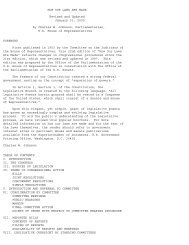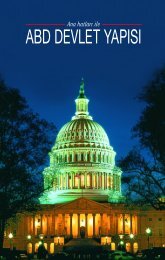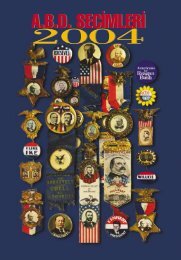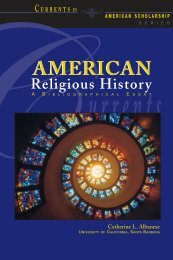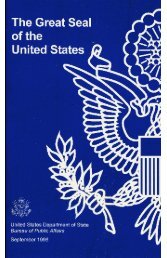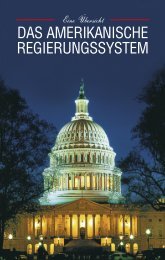CRS Report for Congress - About the USA
CRS Report for Congress - About the USA
CRS Report for Congress - About the USA
- No tags were found...
Create successful ePaper yourself
Turn your PDF publications into a flip-book with our unique Google optimized e-Paper software.
<strong>CRS</strong>-4of committees; expanded <strong>the</strong> assistance provided by <strong>the</strong> <strong>Congress</strong>ional Research Service;and streng<strong>the</strong>ned <strong>the</strong> program evaluation responsibilities of GAO. The <strong>Congress</strong>ionalBudget Act of 1974 (P.L. 93-344) allowed committees to conduct program evaluation<strong>the</strong>mselves or contract out <strong>for</strong> it; streng<strong>the</strong>ned GAO’s role in acquiring fiscal, budgetary,and program-related in<strong>for</strong>mation; and upgraded GAO’s review capabilities.Besides <strong>the</strong>se general powers, numerous statutes direct <strong>the</strong> executive to furnishin<strong>for</strong>mation to or consult with <strong>Congress</strong>. For example, <strong>the</strong> Government Per<strong>for</strong>mance andResults Act of 1993 (P.L. 103-62) requires agencies to consult with <strong>Congress</strong> on <strong>the</strong>irstrategic plans and report annually on per<strong>for</strong>mance plans, goals, and results. In fact, morethan 2,000 reports are submitted each year to <strong>Congress</strong> by federal departments, agencies,commissions, bureaus, and offices. Inspectors general (IGs), <strong>for</strong> instance, report <strong>the</strong>irfindings about waste, fraud, and abuse, and <strong>the</strong>ir recommendations <strong>for</strong> corrective action,periodically to <strong>the</strong> agency head and <strong>Congress</strong>. The IGs are also instructed to issue specialreports concerning particularly serious problems immediately to <strong>the</strong> agency head, whotransmits <strong>the</strong>m unaltered to <strong>Congress</strong> within seven days. The <strong>Report</strong>s Consolidation Actof 2000 (P.L. 106-531), moreover, instructs <strong>the</strong> IGs to identify and describe <strong>the</strong>iragencies’ most serious management and per<strong>for</strong>mance challenges and briefly assessprogress in addressing <strong>the</strong>m. This new requirement is to be part of a larger ef<strong>for</strong>t byindividual agencies to consolidate <strong>the</strong>ir numerous reports on financial and per<strong>for</strong>mancemanagement matters into a single annual report. The aim is to enhance coordination andefficiency within <strong>the</strong> agencies; improve <strong>the</strong> quality of relevant in<strong>for</strong>mation; and provide itin a more meaningful and useful <strong>for</strong>mat <strong>for</strong> <strong>Congress</strong>, <strong>the</strong> President, and <strong>the</strong> public.In addition, <strong>Congress</strong> creates commissions and establishes task <strong>for</strong>ces to study andmake recommendations <strong>for</strong> select policy areas that can also involve examination ofexecutive operations and organizations.There is a long history behind executive reports to <strong>Congress</strong>. Indeed, one of <strong>the</strong> firstlaws of <strong>the</strong> First <strong>Congress</strong>—<strong>the</strong> 1789 Act to establish <strong>the</strong> Treasury Department (1 Stat.66)—called upon <strong>the</strong> Secretary and <strong>the</strong> Treasurer to report directly to <strong>Congress</strong> on publicexpenditures and all accounts. The Secretary was also required “to make report, and givein<strong>for</strong>mation to ei<strong>the</strong>r branch of <strong>the</strong> legislature ... respecting all matters referred to him by<strong>the</strong> Senate or House of Representatives, or which shall appertain to his office.”Separate from such reporting obligations, public employees may provide in<strong>for</strong>mationto <strong>Congress</strong> on <strong>the</strong>ir own. In <strong>the</strong> early part of <strong>the</strong> 20 th century, <strong>Congress</strong> enactedlegislation to overturn a “gag” rule, issued by <strong>the</strong> President, that prohibited employeesfrom communicating directly with <strong>Congress</strong> (5 U.S.C. 7211 (1994)). O<strong>the</strong>r“whistleblower” statutes, which have been extended specifically to cover personnel in <strong>the</strong>intelligence community (P.L. 105-272), guarantee <strong>the</strong> right of government employees topetition or furnish in<strong>for</strong>mation to <strong>Congress</strong> or a Member.House and Senate RulesChamber rules also rein<strong>for</strong>ce <strong>the</strong> oversight function. House and Senate rules, <strong>for</strong>instance, provide <strong>for</strong> “special oversight” or “comprehensive policy oversight,”respectively, <strong>for</strong> specified committees over matters that relate to <strong>the</strong>ir authorizingjurisdiction. In addition, House rules direct each standing committee to require itssubcommittees to conduct oversight or to establish an oversight subcommittee <strong>for</strong> this




